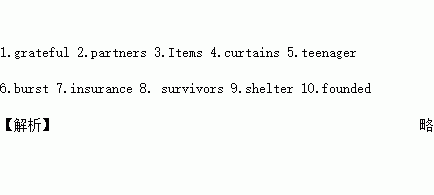题目内容
单词拼写
1. You may feel all the training a waste of time,but I’m a hundred percent sure later you’ll be g________ you did it.
2. The findings challenge a key principle of modern parenting(养育子女)where schools expect them to act as ________ (伙伴) in their children’s education.
3. I_____ like T-shirts that allow volunteers to be recognized publicly for their contributions can help strengthen role identity.
4. Open all the ________(窗帘)and turn up the lights.
5. One Sunday,Nicholas,a ________(青少年),went skiing at Sugarloaf Mountain in Maine.
6.She________ (突然破裂,爆发)into tears at the news that her father had passed away.
7.People without _________(保险) had to pay for their own repairs.
8.The soldiers are trying to help rescue the (幸存者) after the earthquake.
9.Trees along the road provide s________ from the sun for the farmers.
10.A good relationship has to be f________ on trust.
 智慧课堂密卷100分单元过关检测系列答案
智慧课堂密卷100分单元过关检测系列答案
